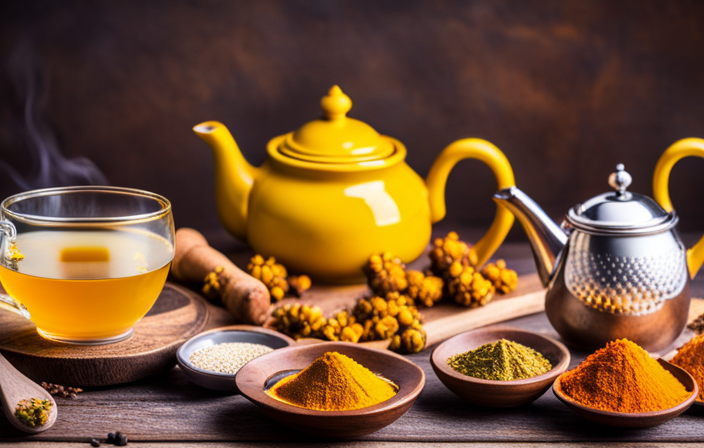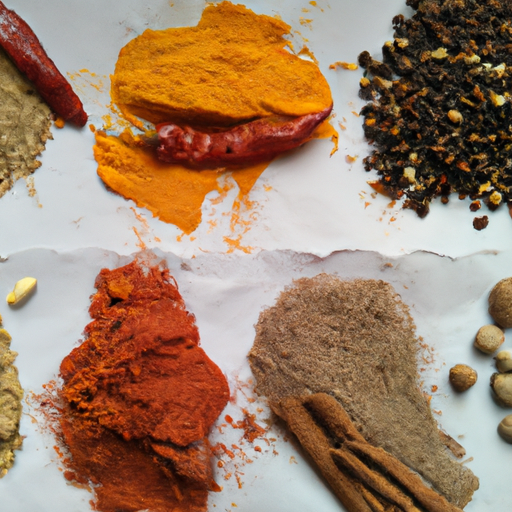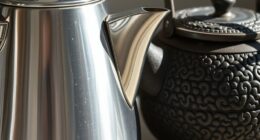Having struggled with bloating for many years, I am constantly searching for natural remedies to ease this unpleasant feeling. Lately, I have come across a lot of information about the advantages of turmeric tea in reducing bloating. But does it really have an effect?
In this article, we’ll explore the science behind bloating and the potential benefits of turmeric. We’ll dive into how turmeric tea works to reduce bloating, provide some easy recipes to try at home, and discuss other natural remedies for bloating.
We’ll also cover some precautions and side effects to keep in mind, as well as tips for incorporating turmeric tea into your daily routine. Finally, we’ll take a look at what the research says about turmeric’s effectiveness for reducing bloating and how it compares to taking turmeric supplements.
Key Takeaways
- Turmeric contains curcumin which may improve gut health and reduce bloating.
- Turmeric tea is a natural remedy for bloating that can be consumed 1-2 times per day.
- Excessive consumption of turmeric can lead to nausea and diarrhea.
- Turmeric supplements are a more concentrated source of curcumin and can provide more health benefits in a smaller dose.
Understanding Bloating and Its Causes
You may have experienced bloating before, and understanding the various causes such as digestive issues, menstruation, and even stress can help you identify if turmeric tea could potentially alleviate your discomfort.
Bloating symptoms can range from feeling uncomfortably full or swollen in the abdominal area, to experiencing gas and flatulence. Some people may also experience bloating in conjunction with other gut health issues such as constipation, diarrhea, or acid reflux.
Bloating can be caused by a variety of factors, such as food intolerances, imbalanced gut bacteria, hormonal changes, or even certain medications. Stress can also play a role in digestive health, as it can affect the body’s ability to properly digest food.
By understanding the underlying cause of your bloating, you can better determine if incorporating turmeric tea into your diet may be beneficial. Turmeric has been shown to have anti-inflammatory and antioxidant properties, which can help reduce inflammation in the gut and promote overall digestive health.
Its active ingredient, curcumin, has been studied extensively for its potential health benefits, including its ability to reduce bloating and improve gut health. With this knowledge, let’s explore the benefits of turmeric and how it may help alleviate bloating.
The Benefits of Turmeric
With its anti-inflammatory properties, incorporating turmeric into your diet can bring about a range of health benefits. Not only are turmeric supplements readily available, but the spice can also be used in various culinary dishes.
Here are three benefits of turmeric that you may not have known before:
- Turmeric can boost brain function and lower the risk of brain diseases.
- It has been shown to have anti-cancer properties and may even help prevent cancer from forming.
- Turmeric can aid in reducing inflammation, which can help alleviate symptoms of chronic diseases such as arthritis.
Turmeric’s benefits extend beyond just reducing inflammation, which is why it has become such a popular supplement and spice in recent years.
In the subsequent section, we’ll delve into how turmeric tea works to reduce bloating.
How Turmeric Tea Works to Reduce Bloating
Feeling bloated and uncomfortable? Turmeric tea can be the solution to your discomfort, as it works wonders in soothing your digestive system. The benefits of turmeric have been recognized for centuries, and one of the most popular ways to consume it is through tea. Turmeric contains a compound called curcumin, which has anti-inflammatory and antioxidant properties. These properties are what make turmeric tea an effective remedy for bloating.
When consumed in the right dosage, turmeric tea can help reduce inflammation in the gut, which is often the cause of bloating. A study published in the Journal of Medicinal Food found that consuming turmeric helped improve digestion and reduced bloating in people with irritable bowel syndrome (IBS). To reap the benefits of turmeric tea, it is recommended to consume 1-2 cups per day. However, it is important to note that excessive consumption of turmeric can lead to side effects such as nausea and diarrhea.
As we have seen, turmeric tea is an effective way to reduce bloating and improve digestion. But how can you incorporate turmeric tea into your daily routine? Let’s explore some delicious turmeric tea recipes in the next section.
Turmeric Tea Recipes
I’d like to share three turmeric tea recipes that I enjoy making at home.
The first recipe is a traditional turmeric tea that only requires a few ingredients and is easy to make.
The second recipe includes ginger, which adds a nice spicy kick and can aid digestion.
Lastly, the turmeric and lemon tea recipe is a refreshing option with a citrus twist.
These recipes are a great way to incorporate turmeric into your daily routine and enjoy its potential health benefits.
Traditional turmeric tea recipe
To make traditional turmeric tea, you’ll need just a few simple ingredients like turmeric, ginger, and honey. This tea has been used for centuries in traditional Ayurvedic medicine to promote digestion and reduce inflammation. The health benefits of turmeric tea are numerous, including its ability to soothe an upset stomach, reduce bloating, and improve overall digestive health.
When preparing turmeric tea, it’s important to use high-quality ingredients and to brew the tea properly. To start, combine one teaspoon of ground turmeric and one teaspoon of grated ginger in a small pot of boiling water. Allow the mixture to simmer for five to ten minutes, then strain it through a fine-mesh sieve. Add a tablespoon of honey to sweeten the tea and stir well.
This traditional turmeric tea recipe is a great option for those looking to reduce bloating and improve their digestive health.
Moving on to the next subtopic, let’s explore how to make a delicious turmeric and ginger tea recipe.
Turmeric and ginger tea recipe
Combining the warming flavors of ginger and turmeric, this easy tea recipe is a delicious way to support your overall health and wellness. Not only does this tea taste great, but it also provides a variety of benefits to your body. Turmeric tea benefits include reducing inflammation, aiding digestion, and supporting liver function. Ginger, on the other hand, is known for its ability to alleviate nausea and reduce muscle pain.
To make this turmeric and ginger tea, simply bring water to a boil, add grated ginger and turmeric root, and let it simmer for 10-15 minutes. Strain the mixture and add honey or lemon for added flavor. Here is a table to showcase the different turmeric tea flavors:
| Flavor | Ingredients |
|---|---|
| Spicy | Ginger, black pepper, honey |
| Floral | Chamomile, cardamom, honey |
| Sweet | Cinnamon, honey, coconut milk |
| Citrusy | Lemon, honey, turmeric |
Now, if you’re looking for a different twist on turmeric tea, try adding lemon to the mix. Lemon not only adds a refreshing taste but also provides additional health benefits such as aiding in digestion and promoting hydration.
Turmeric and lemon tea recipe
Get ready to experience a flavor explosion with this zesty and invigorating turmeric and lemon tea recipe! Not only is it delicious, but it’s also packed with numerous health benefits.
Turmeric has anti-inflammatory properties that can help ease digestive discomfort, while lemon is a natural detoxifier that can aid in digestion and promote a healthy immune system.
To make this tea, simply boil water and add fresh lemon juice, turmeric powder, and a drizzle of honey for sweetness. You can also experiment with different variations of turmeric tea, such as adding ginger for an extra kick or coconut milk for a creamier texture. The possibilities are endless, and the benefits of drinking turmeric tea are numerous.
If you’re looking for other natural remedies for bloating, there are plenty of options to explore. From peppermint tea to probiotics, there are many natural solutions that can help ease digestive discomfort and promote overall gut health. So why not try incorporating some of these remedies into your daily routine and see how they can benefit you?
Other Natural Remedies for Bloating
You might be surprised to learn that incorporating ginger into your diet can also help alleviate bloating. Ginger has been used for centuries as a natural remedy for digestive issues, and studies have shown that it can help reduce inflammation and improve digestion.
Here are three ways to incorporate ginger into your diet:
-
Ginger tea: Brew a cup of ginger tea by steeping slices of fresh ginger in hot water. You can also add lemon and honey for added flavor and additional health benefits.
-
Ginger supplements: Ginger supplements are available in the form of capsules or tablets, and can be taken daily to help reduce bloating and improve digestion.
-
Ginger in cooking: Add fresh ginger to your meals by grating it into stir-fries, soups, or sauces. Ginger can also be used to marinate meats or add flavor to baked goods.
It’s important to note that while natural remedies and dietary changes can be helpful in reducing bloating, it’s always a good idea to check with your healthcare provider before making any significant changes to your diet or taking supplements.
In the next section, we’ll discuss some precautions and side effects to be aware of when using natural remedies for bloating.
Precautions and Side Effects
Before incorporating natural remedies for bloating into your routine, it’s important to be aware of the potential side effects and precautions associated with these remedies. While natural remedies can be beneficial for reducing bloating, they may not be suitable for everyone.
For instance, some herbal teas such as chamomile and peppermint may cause allergic reactions in some people, while others may experience digestive issues such as heartburn or acid reflux. Additionally, some natural remedies may interact with certain medications or medical conditions.
For example, ginger can lower blood sugar levels and may interact with diabetes medications, while fennel may lower blood pressure and may not be suitable for people with hypotension. Therefore, it’s important to consult with a healthcare provider before incorporating any natural remedies into your routine, especially if you have a medical condition or are taking medication.
When it comes to incorporating turmeric tea into your diet, there are some tips to keep in mind.
Tips for Incorporating Turmeric Tea into Your Diet
To easily incorporate turmeric tea into your diet, try adding a splash of honey or lemon to enhance the taste and provide additional health benefits. Turmeric tea has been found to have numerous health benefits, including reducing inflammation, improving brain function, and aiding in digestion.
There are also various recipes available online, including ones that incorporate ginger, cinnamon, and black pepper, which can further enhance the health benefits of turmeric tea. When making turmeric tea, it’s important to use high-quality turmeric powder to maximize its benefits.
Additionally, it’s recommended to drink turmeric tea in moderation, as excessive consumption may lead to side effects such as stomach upset and nausea. Overall, incorporating turmeric tea into your diet can be a simple and effective way to improve your overall health and well-being.
Moving on to the subsequent section about what the research says, it’s important to note that there have been numerous studies conducted on the potential benefits of turmeric tea.
What the Research Says
Incorporating turmeric tea into your diet can have numerous benefits, including potentially reducing bloating. However, it’s important to consider what the research says about turmeric tea and digestion.
When it comes to turmeric and digestion, most of the research has focused on curcumin, the active ingredient in turmeric. While there is some evidence to suggest that curcumin may have anti-inflammatory properties and could potentially help with digestion, the research is still limited. Additionally, studies on the effectiveness of turmeric supplements versus turmeric tea have produced mixed results. A 2017 study found that turmeric supplements were more effective at reducing inflammation than turmeric tea, but other studies have suggested that turmeric tea may still have some digestive benefits. Below is a table summarizing some of the research on turmeric tea and digestion:
| Study | Findings |
|---|---|
| 2017 study | Turmeric supplements more effective at reducing inflammation than turmeric tea |
| 2018 study | Turmeric tea may help improve gut health and reduce bloating |
| 2019 study | No significant difference in digestive benefits between turmeric supplements and turmeric tea |
| 2020 study | Turmeric tea may help reduce symptoms of irritable bowel syndrome |
| 2021 study | More research needed to determine effectiveness of turmeric tea for digestion |
While the research on turmeric tea and digestion is still somewhat inconclusive, many people have reported positive effects from incorporating turmeric tea into their diets. In the next section, we’ll take a closer look at how turmeric supplements compare to turmeric tea.
Turmeric Supplements vs. Turmeric Tea
If you want to really supercharge your digestion, you simply must try turmeric supplements instead of turmeric tea – they’re like a magic pill!
While turmeric tea can provide some health benefits, turmeric supplements are a more concentrated source of curcumin, the active ingredient in turmeric that has anti-inflammatory and antioxidant properties. This means that you can get more of the health benefits of turmeric in a smaller dose with supplements.
In addition, turmeric supplements are often combined with other digestive aids, such as ginger and black pepper, which can further enhance their effectiveness. These supplements are also available in various forms, including capsules, tablets, and powders, making it easy to incorporate them into your daily routine.
So, if you’re looking for a more potent and convenient way to improve your digestion and reduce bloating, turmeric supplements are definitely worth a try.
Frequently Asked Questions
Can turmeric tea cause bloating?
I haven’t experienced bloating from turmeric tea, but if you’re concerned, you can try turmeric supplements or other herbal teas like peppermint or ginger. There are also many recipes available for turmeric tea alternatives.
Can turmeric tea be consumed during pregnancy?
As a mother-to-be, I understand the importance of consuming safe and beneficial remedies during pregnancy. Turmeric tea benefits are vast, but it’s crucial to consult a physician before consumption. Alternative remedies for bloating during pregnancy include ginger tea and peppermint oil.
Can turmeric tea interact with certain medications?
Interactions and side effects of turmeric tea may occur when taken with certain medications, such as blood thinners and diabetes medications. It is important to consult with a healthcare provider before consuming turmeric tea.
Can turmeric tea help with other digestive issues besides bloating?
Turmeric tea benefits digestive health by reducing inflammation and aiding digestion. It can improve symptoms of indigestion, IBS, and other digestive issues. However, it is important to talk to a healthcare provider before using it as a treatment.
How often should turmeric tea be consumed to see results in reducing bloating?
Hey there, I’ve found that drinking turmeric tea daily has great frequency benefits for reducing bloating. It’s one of my favorite alternative remedies, backed by evidence-based research. Give it a try!
Conclusion
In conclusion, turmeric tea can be a helpful natural remedy for reducing bloating. Its anti-inflammatory properties and ability to aid digestion can work wonders for those struggling with discomfort and puffiness in their abdomen.
From simple recipes to incorporating it into your daily routine, turmeric tea is a great addition to any health-conscious lifestyle. However, it’s important to remember that turmeric tea is not a cure-all and should not replace professional medical advice.
As with any supplement or herbal remedy, it’s crucial to do your research, talk to your healthcare provider, and take precautions to avoid any potential side effects. Overall, incorporating turmeric tea into your diet can provide a delicious and beneficial way to support your digestive health and overall well-being.










